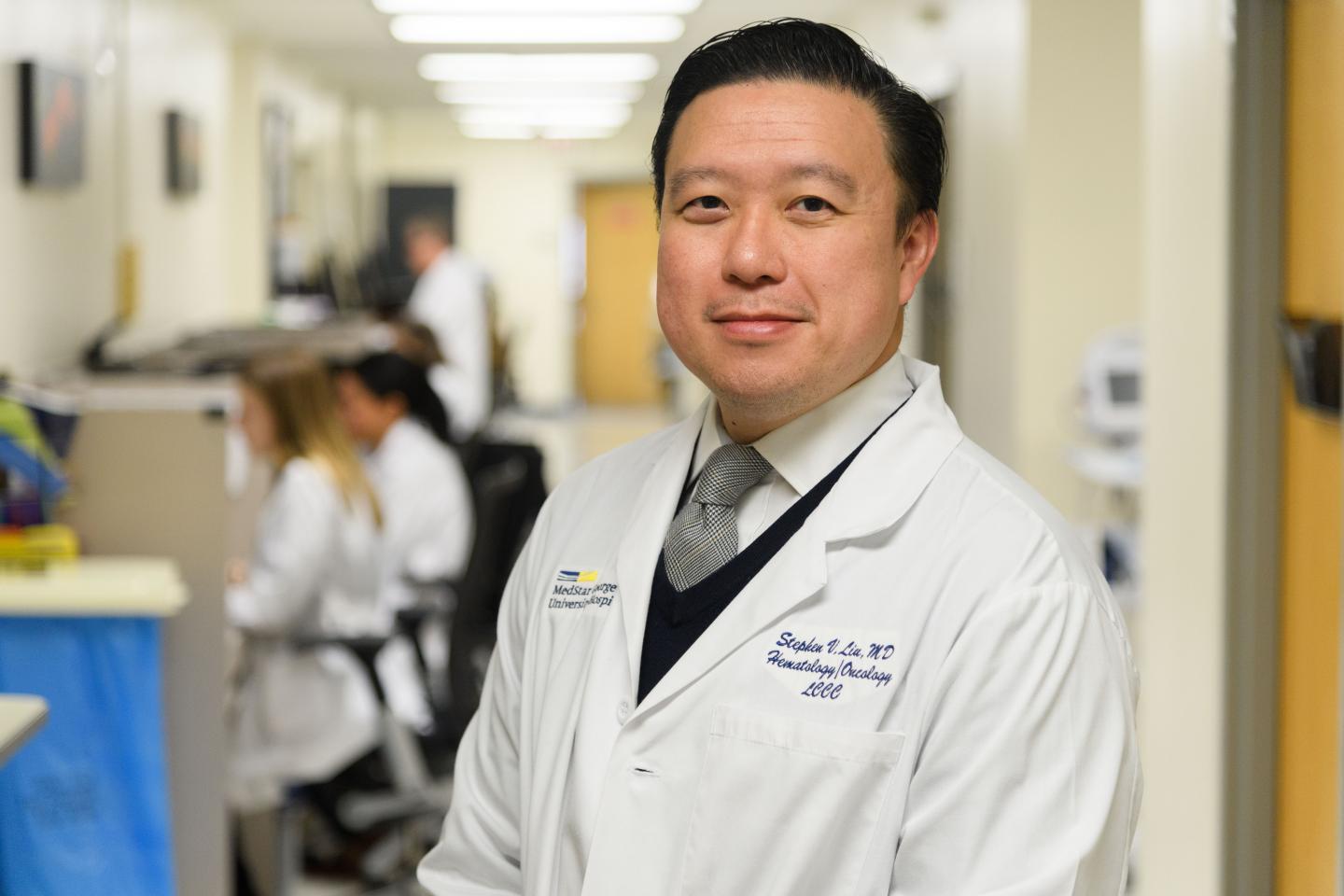
Credit: Georgetown University
WASHINGTON — A consortium of researchers led by Georgetown Lombardi Comprehensive Cancer Center investigators have completed the largest analysis of a new gene fusion they believe is responsible for development of a wide spectrum of cancer types. They say their studies show that errant gene fusions in neuregulin-1 or NRG1, which are present in about 0.2 percent of cancers, can be targeted with existing agents, although a novel therapy could effectively shut these cancers down.
The discovery, reported in Clinical Cancer Research, represents an emerging field of research in which investigators focus on targetable genes responsible for the development of cancers instead of focusing on the organ or body site in which the cancer appears. This approach is known as “tumor agnostic.”
Late last year, the FDA approved the first targeted cancer drug that is based on tumor genetics seen across many cancer types. The drug targets another gene fusion (NTRK) believed responsible for 1 percent of solid tumor cancers.
“What all cancer researchers want is to find the right treatment for the right patient, regardless of where the tumor is. The future is to profile tumors in order to find unique vulnerabilities that can be treated with effective molecular therapy, and this research represents another step toward that goal,” says the study’s senior researcher, Stephen V. Liu, MD, an associate professor of medicine at Georgetown Lombardi.
The NRG1 fusion occurs when the NRG1 gene, essential for normal development of the heart and nervous system, fuses together with another gene, such as CD74, a transmembrane protein often found on cancer cells. In this collaborative effort, the Caris Life Sciences’ molecular database was researched to describe the incidence and characterization of NRG1 fusions in solid tumors. This study defined the incidence of NRG1 fusions in almost 22,000 tumor specimens — the largest such study to date. The greatest incidence of NRG1 fusion was in non-small lung cancer, but the gene fusion, best found through RNA sequencing, was also found in kidney, gallbladder, bladder, ovarian, pancreatic, breast and colorectal cancers, as well as in sarcoma and neuroendocrine cancers.
“Patients with these NRG1-linked cancers may derive less benefit from immunotherapy or usual treatments for site specific cancers than they would receive from therapy that targets what is actually driving their cancer,” says Liu.
The researchers also found NRG1 fusion “partners” — proteins that bind with NRG1 proteins to make a pro-oncogenic pathway –are variable within and across tumor types.
“Precision oncology can change treatment of cancer. It is elegant and rational –treatment of NRG1 cancers will be the next big advance in targeted therapy, and patients should be tested for these types of alterations,” he says.
###
Study co-authors include Sushma Jonna, MD, from Georgetown; Rebecca A. Feldman, PhD, Jeffrey Swensen, PhD, Zoran Gatalica, MD, and Wolfgang M. Korn, MD, from Caris Life Science in Phoenix; Hossein Borghaei, DO, from Fox Chase Cancer Center; Patrick C. Ma, MD, from West Virginia University Cancer Center; Alexander Spira, from Virginia Health Specialists, MD, PhD; Ari Vanderwalde, MD, PhD, from West Cancer Center in Memphis; Antoinette Wozniak, MD, from the University of Pittsburgh Medical Center, and Edward S. Kim, MD, from Atrium Healthcare in Charlotte.
Liu reports consulting/advisory role with Apollomics, Boehringer-Ingelheim, G1 Therapeutics, Genentech/Roche, Ignyta, Guardant 360, Inivata, Pfizer, Lilly, Merck, Taiho Pharmaceutical, Bristol-Myers Squibb, AstraZeneca, Takeda, HERON and Regeneron and has received research funding from Genentech/Roche, Pfizer, Threshold Pharmaceuticals, Clovis Oncology, Corvus Pharmaceuticals, Esanex, Bayer, OncoMed, Merck, Lycera, AstraZeneca, Ignyta, Molecular Partners, Blueprint Medicines, Lilly and Rain Therapeutics. Additional disclosures of other authors is listed in the publication.
About Georgetown Lombardi Comprehensive Cancer Center
Georgetown Lombardi Comprehensive Cancer Center is designated by the National Cancer Institute as a comprehensive cancer center — the only cancer center of its kind in the Washington, DC area. A part of Georgetown University Medical Center and MedStar Georgetown University Hospital, Georgetown Lombardi seeks to improve the diagnosis, treatment, and prevention of cancer through innovative basic and clinical research, patient care, community education and outreach, and the training of cancer specialists of the future. Connect with Georgetown Lombardi on Facebook) and Twitter (@LombardiCancer).
About Georgetown University Medical Center
Georgetown University Medical Center (GUMC) is an internationally recognized academic medical center with a three-part mission of research, teaching and patient care (through MedStar Health). GUMC’s mission is carried out with a strong emphasis on public service and a dedication to the Catholic, Jesuit principle of cura personalis — or “care of the whole person.” The Medical Center includes the School of Medicine and the School of Nursing & Health Studies, both nationally ranked; Georgetown Lombardi Comprehensive Cancer Center, designated as a comprehensive cancer center by the National Cancer Institute; and the Biomedical Graduate Research Organization, which accounts for the majority of externally funded research at GUMC including a Clinical and Translational Science Award from the National Institutes of Health. Connect with GUMC on Facebook (Facebook.com/GUMCUpdate), Twitter (@gumedcenter) and Instagram (@gumedcenter).
Media Contact
Karen Teber
[email protected]




